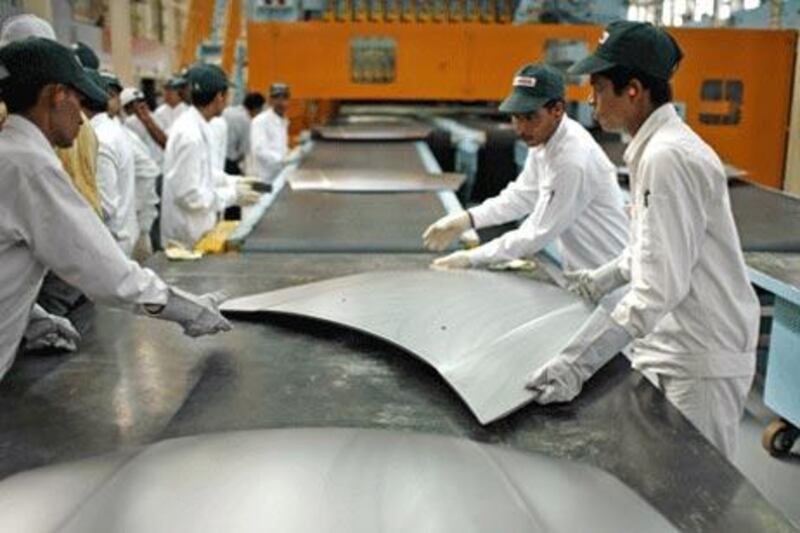JAIPUR // Ten years ago Naren Bakshi, a Silicon Valley entrepreneur, was rich, bored and looking for a cause. A public share offering had just valued his business software start-up Versata at US$4 billion (Dh14.69bn) and Mr Bakshi was feeling grateful, mainly to his friends in The Indus Entrepreneurs (TiE), an international business mentoring and networking group.
"I was searching for how best can I make a difference," Mr Bakshi says, while relaxing at his home in Jaipur. TiE's Silicon Valley chapter had been instrumental in persuading him to throw caution to the winds quite late in life and start up his own business. "Many of my counterparts had gone out and created their own companies and they looked at me and said 'what's wrong with you. You're not only a great technical person, you are also an MBA. Why are you working for somebody else?'"
And so, at 46, with three dependent daughters and a wife, Mr Bakshi started up a company that within a few years was worth billions of dollars. "If I didn't have those connections, I don't think I would have become an entrepreneur, to be honest," he says. At the time, Mr Bakshi's home state of Rajasthan was struggling. Ashok Gehlot, the chief minister, knew he needed help hitching the state's wagon to India's rising star. Most of the 50 million people living in one of India's largest and poorest states worked in agriculture, but Rajasthan was mostly desert and had negligible industrial capacity. The state was best known for its semi-precious gems and some faded maharajas palaces, but it needed more than tourism to secure its future.
Mr Gehlot decided to reach out to all those talented Rajasthanis who had left home in search of greener pastures. After 20 years in the US, Mr Bakshi leapt at the chance to return home and put his skills to good use. He had found his cause to make a difference. Four other expatriate Rajasthanis came forward: Kailash Joshi, Bipin Shah, Raj Desai and Raj Jaswa. "They gave me credibility, gave me a platform and gave me support so it didn't look like it was just me by myself," says Mr Bakshi. "I also brought other people in, prominent people, at different times."
From 2000, he and Mr Gehlot began working together to implement a strategy that soon transformed Rajasthan into one of the most promising states in India. It was all about technology, Mr Bakshi says. They had to make sure the government and businesses were connected to the internet and had computers that they could use for simple communication, via e-mail for example. In 2000, Rajasthan was a place where women were forbidden to work past 6pm and computers were a luxury. Fast forward 10 years and government-seeded companies now offer cheap computer classes to anybody willing to spend two hours a day learning. Thirty engineering schools are churning out 10,000 engineers a year. Existing businesses have automated, while new businesses have started up. State revenue has increased seven-fold in as many years.
"The entrepreneurs were there, what was missing was only two things: they needed to modernise their businesses in terms of technology, and they needed global connectivity," Mr Bakshi says. "The world had changed and it was important for them to get connected with every other place where entrepreneurship exists." Rajasthan learnt those lessons quickly. Just a few years ago, Jaipur Rugs had 40,000 independent contractors weaving rugs in their homes. After implementing enterprise resource planning (ERP) systems to better manage its chaotic supply network, the company started reporting double-digit growth and now has six business units with $21 million in annual revenue. ERP systems manage all information and functions of a business, using shared data stores.
Swarovski Crystal is now using a similar process to manage its own supply chain, with products sourced in Rajasthan but exported around Europe. Just 18 months ago, the state seeded $500,000 in Resource Knowledge Corporation, a company supplying cheap and practical courses in all types of computing and book-keeping, as well as English language. It has since earned $15m, based solely on workers willing to spend $60 and two hours a day improving their skills.
The most concrete evidence that Rajasthan was evolving into a major industrial hub came in 2006, when Mahindra and Mahindra chose Jaipur as the location for its second World City. Mahindra World City Jaipur is one of the largest business parks in the world and is rapidly becoming the flag bearer for Rajasthan's stunning reversal of fortunes. Infosys, Wipro, ICICI Bank, State Bank of India, Deutsche Bank and a long list of other marquee names are building both back office and manufacturing capacity at the 1,215-hectare site, which just three years ago was a patch of desert.
The park offers a mix of high-rise office towers, manufacturing capacity and residential centres that include shopping malls, schools and residential housing. Lucrative tax breaks have attracted a variety of businesses to this "city within a city"; a couple of thousand workers are already on site for Infosys and Deutsche Bank, which has moved a significant chunk of its global backhouse operations to Jaipur. Within three years, almost 400 companies are expected to be living and working at Mahindra World City Jaipur, contributing more than 250,000 direct and indirect jobs.
To land a big fish such as Mahindra was a major coup; the Jaipur park is twice the size of the company's flagship World City in Chennai. "After Chennai, you can imagine, practically every government wanted us to be in their state," says Ashish Mathur, the business development manager for Mahindra Group. It was Mr Bakshi that triggered Mahindra's decision, when he invited the then chief minister Vasundhara Raje to speak at a TiE event in Silicon Valley, where she met both Anand Mahindra and Narayan Murthy of Infosys.
Both spelt it out for her: if she wanted to attract major industry to Rajasthan, the state had to have something to offer. Ms Raje immediately established major state infrastructure upgrades that are continuing today. Rajasthan is building a ring road, a rail road, a convention centre, an electrical grid, even a metro; its capital expenditure last year was $18bn, or nearly twice the total value of the 2003 budget. "The government here doesn't take any time to take decisions and move forward," says Mr Mathur. "They knew they were lagging behind, so to compensate they moved at lightning speed."
But perhaps the state's greatest advantage was a team of politicians and bureaucrats committed to working together to make change happen, regardless of who won the latest election. Vivek Wadhwa, the executive in residence at Duke University and an expert on industrial policy, says that unlike so many failed business parks, the Mahindra park is rooted in a bottom-up, rather than top-down, approach.
"Entrepreneurs began to work with and to educate government officials," he says. "They had to learn about technology, open the economy and focus on education. Everyone wants economic growth and prosperity. Entrepreneurs like Naren Bakshi showed them how to achieve this." Rajasthan also discovered that it had some natural advantages. More than one third of the Delhi-Mumbai Corridor, a dedicated freight transport route now being constructed, runs through Rajasthan. Industrial development is expected to spread along that route. Jaipur is also located within the "golden quadrilateral", an area of well connected roads, railroads and ports.
"So goods transport is very straightforward," Mr Mathur says. "You can go anywhere in India in the morning and come back in the evening." The state has a huge talent pool and is known for producing a high proportion of India's chartered accountants, MBAs and entrepreneurs. "Jaipur had every potential to emerge as a BFSI [banking, financial services and insurance] centre," he says, but having a bureaucracy willing to listen is also crucially important. "If you have an idea, right from the bottom to the top, they will meet you and listen to you, and if they find merit in your ideas they will move ahead. It makes for a progressive state."
TiE has now opened a chapter in Dubai, headed by Prashant Gulati, a native of Rajasthan. @Email:business@thenational.ae





